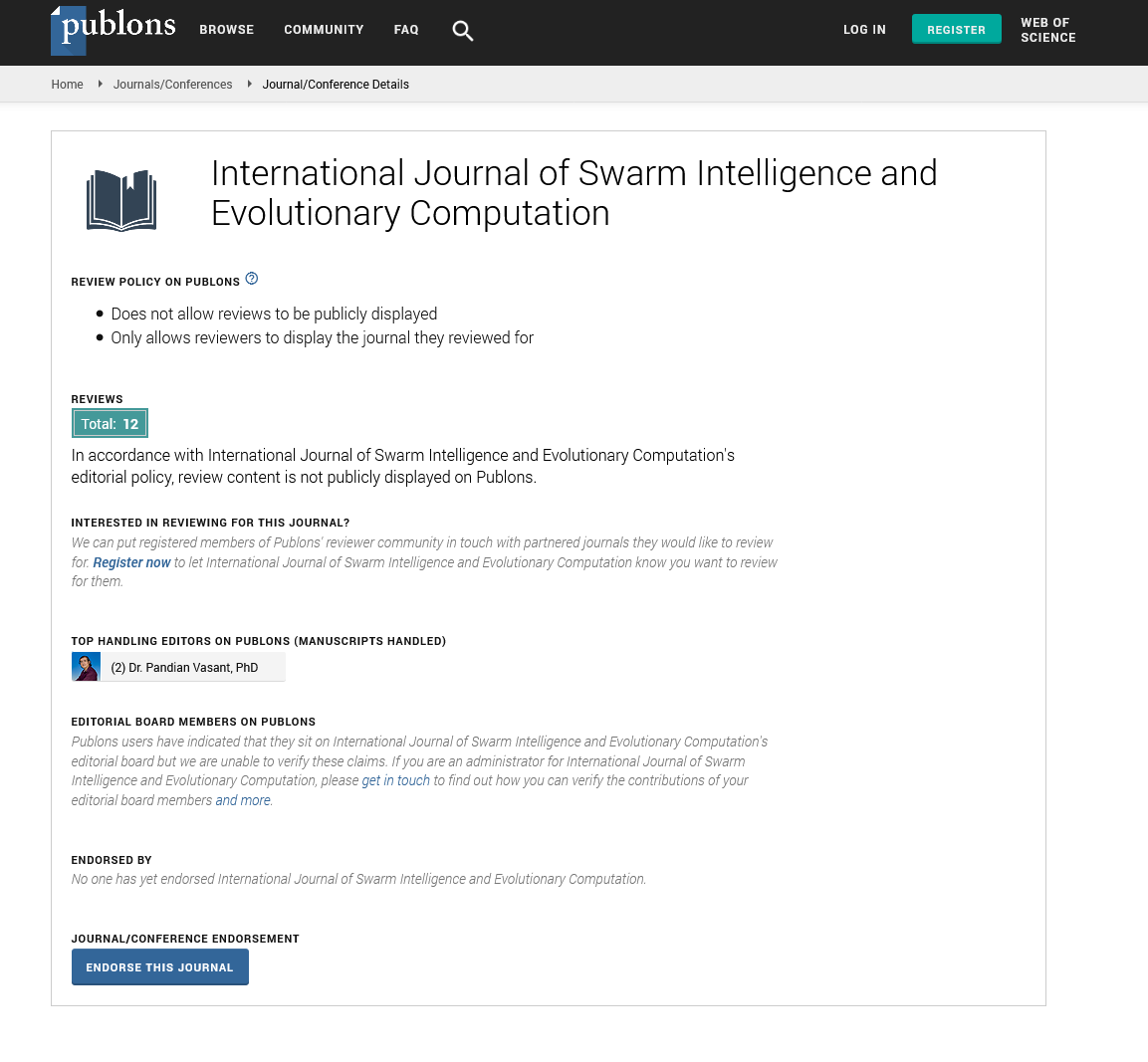Indexed In
- Genamics JournalSeek
- RefSeek
- Hamdard University
- EBSCO A-Z
- OCLC- WorldCat
- Publons
- Euro Pub
- Google Scholar
Useful Links
Share This Page
Journal Flyer

Open Access Journals
- Agri and Aquaculture
- Biochemistry
- Bioinformatics & Systems Biology
- Business & Management
- Chemistry
- Clinical Sciences
- Engineering
- Food & Nutrition
- General Science
- Genetics & Molecular Biology
- Immunology & Microbiology
- Medical Sciences
- Neuroscience & Psychology
- Nursing & Health Care
- Pharmaceutical Sciences
Commentary - (2023) Volume 12, Issue 2
Harnessing the Power of Cloud Computing in Machine Learning
Vishal Sharma*Received: 22-Feb-2023, Manuscript No. SIEC-23-20958; Editor assigned: 24-Feb-2023, Pre QC No. SIEC-23-20958 (PQ); Reviewed: 10-Mar-2023, QC No. SIEC-23-20958; Revised: 17-Mar-2023, Manuscript No. SIEC-23-20958 (R); Published: 27-Mar-2023, DOI: 10.35248/2090-4908.23.12.308
Description
Machine learning has emerged as a powerful technique for extracting meaningful insights from vast amounts of data. It has been widely adopted in various domains, including healthcare, finance, e-commerce, and marketing, to name a few. However, the success of machine learning largely depends on the availability of ample computing resources, storage, and tools for data processing and model training. This is where cloud computing has come to play a pivotal role in transforming the landscape of machine learning.
Cloud computing refers to the delivery of computing resources, including computing power, storage, and software, as a service over the internet. Cloud platforms offer organizations the flexibility to access and utilize these resources on-demand, with the ability to scale up or down based on their needs. This has made machine learning more accessible, affordable, and scalable than ever before.
Benefits of cloud based machine learning
Cloud computing has revolutionized the field of machine learning by providing a plethora of benefits that have transformed the way organizations approach data-driven insights.
Scalability: One of the key advantages of cloud-based machine learning is its scalability. Cloud platforms offer virtually limitless computing resources and storage, enabling organizations to scale their machine learning workloads up or down based on their requirements. This eliminates the need to invest in expensive hardware infrastructure upfront, making it more cost-effective and agile. Organizations can easily adjust their computing resources to accommodate changes in data volume, processing requirements, or model complexity, ensuring optimal performance and efficiency.
Accessibility: Cloud-based machine learning has democratized access to advanced computing resources and tools, making it more accessible to organizations of all sizes and sectors. Cloud platforms provide a user-friendly interface and a wide range of machine learning tools and frameworks that can be easily accessed and utilized by data scientists, developers, and researchers, regardless of their location. This has democratized access to cutting-edge machine learning technologies, enabling small and medium-sized enterprises and researchers with limited resources to leverage the power of machine learning for their data-driven insights.
Cost-efficiency: Cloud-based machine learning offers significant cost savings compared to traditional on-premises infrastructure. With cloud platforms, organizations only pay for the resources they use, without having to invest in costly hardware, maintenance, and upgrades.
Collaboration: Cloud-based machine learning enables seamless collaboration among team members, regardless of their geographical location. Cloud platforms provide collaborative tools and environments that allow data scientists, developers, and researchers to work together in real-time, share code, datasets, and models, and collaborate on machine learning projects. This promotes teamwork, knowledge sharing, and innovation, enabling organizations to leverage the collective expertise of their team members to develop more accurate and robust machine learning models.
Challenges of cloud based machine learning
While cloud-based machine learning offers numerous benefits, it also poses certain challenges that organizations need to consider and address for successful implementation.
Data privacy: One of the major concerns in cloud-based machine learning is the privacy of data. Organizations need to ensure that sensitive data used in machine learning models, such as customer information, healthcare records, or financial data, is adequately protected to comply with data privacy regulations. Data encryption, access controls, and auditing mechanisms should be implemented to safeguard data privacy in the cloud.
Security: Cloud-based machine learning introduces potential security risks, as data and models are stored and processed outside the organization's premises. Organizations need to implement robust security measures, such as firewalls, intrusion detection systems, and regular security audits, to protect against data breaches, unauthorized access, and other security threats. Additionally, data transfer and communication between the organization's premises and the cloud should be secured using encryption and other security protocols.
Citation: Sharma V (2023) Harnessing the Power of Cloud Computing in Machine Learning. Int J Swarm Evol Comput. 12:308.
Copyright: © 2023 Sharma V. This is an open-access article distributed under the terms of the Creative Commons Attribution License, which permits unrestricted use, distribution, and reproduction in any medium, provided the original author and source are credited.


